Natalie Portman: Queen of Artifice
 Wednesday, November 22, 2023 at 10:00PM
Wednesday, November 22, 2023 at 10:00PM 
Some actors thrive through mimesis, reaching for realism when performing. In cinema, they bring the actuality of everyday life to the screen, psychology and material terms. Or they replicate others like straight mirrors. Since midcentury developments, that approximation of off-screen life has been standardized into what most recognize as "good acting." It's the mainstream, the rule, the de facto way of doing things. But is it the only way? I would think not and have grown to appreciate those who step outside those lines, whether deliberately, through their director's influence, or by mere accident.
When done right, embracing fakery may feel more honest and insightful than the attempt to copy - realer than real, truer than truth. All this to say, I love Natalie Portman at her most artificial and absurd…
For years, Natalie Portman wasn't one's idea of a great actress. She started young with excellent reviews in Léon: The Professional but soon fell into a trap of perceived incompetence. Most folk don't regard her stint in the Star Wars universe as especially good, and even her solid turns in the likes of Where the Heart Is and Cold Mountain revealed her limitations as much as they proved that, in the right circumstances, she could act. Thus contextualized, Mike Nichols' Closer felt like a fluke, a once-in-a-lifetime opportunity to shine in an ideal for Portman's specificities.
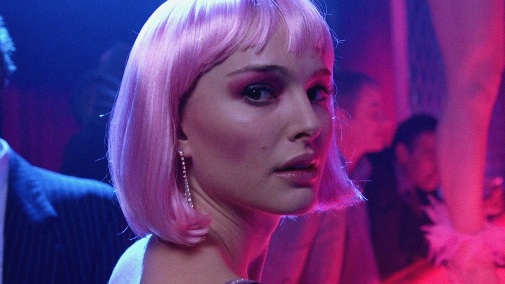
It earned her a well-deserved Best Supporting Actress Oscar nomination. Yet, at the same time, it didn't dispel a general consensus that she wasn't all that. Still, looking back, her best moments in that film feel like a signal of what's to come, an early indicator that Portman was best when transcending notions of conventional realism. A striptease conversation with Clive Owen persists in the memory, not because the pink-wigged pixie drips with authenticity. Instead, it's the performative nature of the scene that stands out, how Portman articulates a game of make-belief cloistered within another characterization.
An ordinary mirror no more, the actress reveled in the chance to clash reflections. In Black Swan, she got to shatter them for a director most interested in examining the jagged edges pinked with blood. The cracks are Aronofsky's focus, but they aren't what I most prize in the Oscar-winning performance. A mirror's effort to stay whole fascinates, as do instances when Portman's ballerina is acting, whether for herself or others, when she's subsuming her neurosis to play the on-stage swans. It's the theatrical gesture in dreams and the self-regard before a vanity, the perplexing brittleness of a final dive.
What a pity that her career post-victory seemed calibrated for stardom and commonplace prestige with a detour into Malickland for some unconvincing abstraction. By a miracle, this path took her to Pablo Larraín, and, at long last, the world got to see what Portman could do with the right vision. As if playing a theoretic deconstruction of biopic performance, she's mannered to the point of grotesque as the former First Lady, the gulf between thespian and role ever-present, stark and impossible to ignore. One is always aware of Natalie Portman within this Jackie, so much so that the friction becomes the point of the exercise rather than its failure. It's the opposite of disappearing into a role.
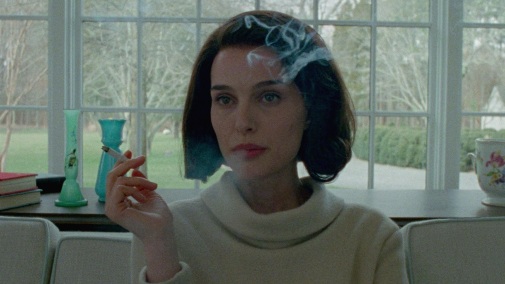
Mike Nichols made Portman a mirror looking into its reflection. Aronofsky studied the cracked surface. Larraín reconstructs the shatters as a polyhedric sculpture, every edge showing a different angle. In more painterly terms, it's a feat of cubist portraiture with all the possible perspectives coexisting on the same plane, flattened for screen projection but vivid nevertheless. Think about that glorious passage when the moment of assassination is invoked, tears spilled and voice trapped in reliving grief. But then she disconnects from that emotion and proclaims not to smoke while enjoying a cigarette. It's as startling as it is brilliant.
Jackie is performing for numerous audiences, and so is Portman, their artifices combined so that we get to examine History as a myth in construction, a collage necessarily diverged from lived experience. If you can't imagine this is how the real person behaved, that's fine, but it's also missing what the film offers, its games and wildness. Jump to 2018, you've got two other gems of unconvincing humanity in Annihilation and Vox Lux. Again, the brilliance lies in the exertion of actorly muscles, effort plain to see, whether extrapolating alienation from beyond or a pop star's reinvention of the self with a crazy accent to match.
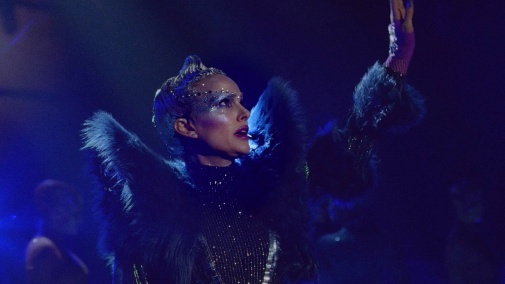
Yes, maybe this is me rationalizing being enthralled by "bad acting," finding purpose in the mess that entertained me. But, some things shouldn't matter when examining art or, at the very least, should be flexibly considered. What matters isn't an adherence to set rules, ordinary dichotomies of good taste, or, to an extent, the artist's intention. What should matter is the final film, the unfolding untruth on screen, and how it provokes reactions of curiosity cum revulsion, how it inspires reflection and shocks new ideas into being. When tapping into artificiality, Natalie Portman is one of Hollywood's most fascinating stars.
Even she must be aware of it to some extent, having championed May December into existence as its producer and leading lady. It was Portman who supposedly brought the project to Todd Haynes, putting into motion this twisted take on the Mary Kay Letourneau scandal. She plays Elizabeth, a TV star aspiring to serious actressing, who goes to Georgia on a research trip for her next project. Twenty years after the fact, a movie is being made about the pet shop employee who started a sexual relationship with her tween underling. After jail, Gracie married Joe, with whom she had children, complicating a bond born out of what most would classify as abuse. Elizabeth will be Gracie on screen.
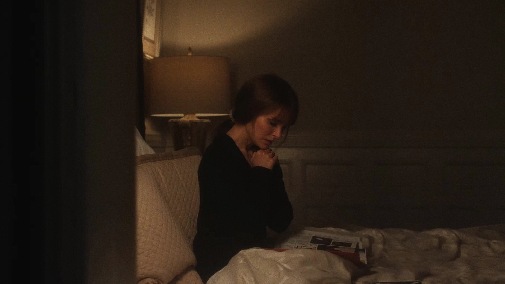
Within its kaleidoscope of excused predation and whatnot, May December forms a troubling portrait of its three central personalities. At times, it feels like each actor is playing within a separate movie - so, while Julianne Moore and Portman inhabit a campy perversion of the serious topic, Charles Melton punctures the audience's understanding by illuminating the story's human cost. It's the kind of movie that will coax you into uncomfortable laughter, make you feel at ease with the lark, and then pull the carpet from under you. May December acts like a cascade of contradictory impulses at odds with the character's desire for tidy explanations and a peaceful status quo.
The fundamental facts of this tabloid fodder reside in a gray area that its protagonists can't abide, nor can the society that created them or the industry ready to cannibalize into indie film Pablum. There's no easy way out of the conundrums proposed, and how the actors work like puzzle pieces that won't fit is part of the "fun." Portman and Moore, in particular, are playing two sides of the same coin, manipulative entities that weaponize white womanhood and apparent sexual fragility, their projected helplessness a crucial tool in their dealings with Melton's Joe. But, of course, for as many similarities, they aren't close. Elizabeth and Gracie are miles apart.
And that applies to how the actresses embody their roles. Moore plays Gracie like a real person, all lisping self-delusion under the microscope, finding a litany of details with which she gives access to Gracie's interiority while guarding parts of the woman from us, maybe even from the character herself. On the other hand, Portman is more conceptual, like a parody of Liv Ullmann's Elisabeth Vogler that's less eerie but more obviously vampiric. I know that, during certain scenes, I felt the urge to go all Cate Blanchett in Notes on a Scandal, screaming "you're a fucking vampire" at the screen. A fucking vampire and a mirror, of course.
Many scenes in May December are staged around such objects. And they do invoke a sense of Persona through the looking glass, tawdrily shot like an artsy soap opera, digital footage with post-production grain on top. Even the image quality is a wannabee deception in this imitation game!
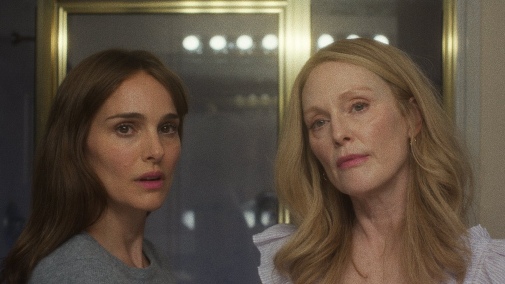
That aesthetic falsity is reflected in the gap between Gracie and the Elizabeth-made facsimile that appears at the end of May December. That is the fulcrum of Portman's work. Her feeble-voiced Elizabeth copies gestures with studied, über self-conscious, poses, highlighting the superficiality of mimicry all along. Every interaction is a chance to add new assets to her repertoire, akin to ChatGPT accumulating data points for its AI creation. Only she's almost human, as much as a screen construct can be, while also representing a conflagration of ideas on the very notion of acting. It culminates in memorable scenes that might be the best examples one can get of Portman's weird brand of brilliance.
There's the final interaction with Joe when a piece of correspondence is paid for with the illusion of intimacy. The actress has never been as cruel as when she rebuffs Melton's lost soul, delivering the world's hollowest reassurance before stabbing him with "this is just what grownups do." Later, as she reads the letter to her mirror image, Haynes has Portman deliver the monologue like a performance whose construction's caught in media res. She spends a good part of it adjusting the angle of her mouth, twitching facial muscles in the way a malfunctioning android might. It's unnerving and hilarious, humanity inverted into a black hole – the void staring back.
As Elizabeth, Portman's the actor of all actors, a camera in the flesh and the funhouse mirror. In that role and beyond, she's the queen of artifice. All hail the queen!

May December is currently in theaters, enjoying a limited release before it drops on Netflix on December 1st.



Reader Comments (9)
This was totally brilliant. I never really understood why I loved her as an actress. I did not buy her as an unwed mother. Or whatever she was doing in "Star Wars." But I like her. She radiates the intellect of Jodie Foster without the soul that Foster brings with it. It truly is Portman's mastery of artifice that is her sweet spot. No other actress can make that work. She is like an advanced AI version of herself. This made me rethink every performance she has ever given.
You are such a good writer Cláudio! I always love reading your posts, but this one in particular really resonates with me. I adore Natalie and you articulated why in a way I never could. Thank you.
I'm not the worlds most intellectual or well read person,infact I have read about 5 books in my life most of them Stephen King so it's hard for me to process what is being written here.
Are you saying she's a bad actress who can only seem right in artificial type roles or is she a good actress just picking wrong projects or is she simply good or bad depending on the director.
I thought she was superb and should have won the Oscar in Closer and Jackie and enjoyed her a lot in Black Swan,I didn't forget it was an actress for a minute but she sold me on the roles and the way she interpreted Jackie I found fascinating the same way I felt Stewart was totally bad as Diana in Spencer.
I always find it hard to judge bad acting,I just saw Rustin and firmly believe Domingo is performing too much to make the character seem like a person who existed.
I thought GaGa was tremendous in House of Gucci but found McDormand unbelievable in 3 Billboards & Fargo is either bad or is it just ones own opinion.
Leto terrible in most things but wonderful in Dallas Buyers.
Nicholson playing himself in As Good As It Gets good or bad acting or maybe just too big a star to fully disappear.
I know Meryl is going way OTT in Doubt and therefore I am taken out of the film,she becomes unbelievable.
Winslet never seems comfy in The Reader to me but is totally on it in Rev Rd.
I found Foster so warm and funny and honest in Nyad but found Annette stiff with bad line readings and no feel for the character,am I wrong.
Mike Johnson & Julian -- Thank you for the kind words, and I'm glad you took so much from this write-up.
Mr Ripley79 -- Apologies if my writing was confusing. I can recognize I sometimes get taken away by topics of interest and threaten incoherence. Well, let me try to clarify some points.
I'm not especially fond of declaring someone a good or bad actor, preferring to evaluate individual performances. Some specificities that don't work for one project can be brilliant in another, and so forth.
In any case, I'd say Natalie Portman is a good actress who thrives in contexts that exult her talent for artificality. Most awards, critics, and even watchers tend to judge acting based on an approximation to off-screen reality and how natural it feels. To me, that's very limiting and runs against what a performer like Portman is best at. For example, I think she's good overall in BLACK SWAN. Still, the moments I'm drawn to are those I refer to in the text, when she's exploring the performativity of the part rather than its more conventional anxieties and terrors.
This article was me trying to grapple with that situation, that what I prize most about this performer is also what other people - including friends and folks I respect - point to when dismissing her work. Anti-naturalism deserves a place in performance arts and cinema, but it's often lost when the prevailing culture sets strict stylistic and even conceptual limits on what constitutes "good" acting.
I hope that made things a bit clearer. Furthermore, I don't think you're wrong even if I don't agree with all those takes you mentioned. There's no objectivity in art criticism and appreciation, and to reach for it is a fool's errand. All opinions are valid, and nobody's wrong for reacting in a certain way. The plurality of takes and audience responses is part of what makes cinema so interesting.
PO'TMAN MOTHAFUCKA!!!! She's one of my all-time favorites as I grew up on her as I'm eager to see her in May December as I hope she never does anything like Lucy in the Sky ever again. Goddamn, that movie was awful.
First, the author of this commentary is using pompous words and superfluous peppering Latin. The economy of style would have had more impact.
We all know that acting is refined looking at oneself in a mirror… there’s no shame about utilizing mirrors all over again… films bring life to the screen… life is life…
Citing “For years, Natalie Portman wasn't one's idea of a great actress”. I believed the authors must be kidding… Ms. Portman was a child prodigy and a gifted actor at an early age… then she opted for various film styles… it also shows her diverse possibilities and styles… which further proves her acting gifts…
Adding ChatGPT, appears as well-connected fashionista immersed in futuristic high-tech, today’s improper used is so common…
Natalie in her genius externalizing the emotion spectrum through subtle facial expressions is extraordinary… and natural…. miles away from loud laughter with a smile splitting the face from ear to ear… or artificial tears with unnatural contorted face in forced contractions … in contrast, Natalie played her character in whole nuances appearing so true… sometimes leading the public to simulate reality so well that it seems extracted from a real documentary … “in media res”.. not to be confounded with social media… but rather res publica… "this is just what grownups do." In the end, Ms. 23-year-gap, Gracie/Julianne wins. One sentence and Elisabeth/Natalie collapses. The moral of the film comes out intact. This was long-lasting TRUE love...The last and not the least… he/she/they who were a thirteen-year-old student sitting in a classroom never falling in love with a bright-handsome-young teacher… raise your hands please… the question is to keep phantasms on stable Platonic grounds…
In line with the commentary, in the realm of acting, Ms. Natalie Portman, Actor of All Actors, a Camera in Her Genius Brain, a Mirror in her Almond Eyes, we may proclaim “Long Live the Queen! Vivat Regina!”
Beautifully written essay. You articulated so many things I have felt but hadn't connected the dots. Thank you.
I'd enjoy reading your application of the same lens to Kidman at her best, playing a woman playing a part.
She is truly talented. It was evident even in "Leon", which I saw in my childhood. It seems that she was surrounded by true professionals at that time, which undoubtedly played a role in shaping her as an actress. Her debut at such a young age already spoke of her potential, which, it seems, she has only multiplied over the years.
Portman is really terrific in "Black Swan". It's a great performance!
She's good in other movies, like "Léon: The Profesional" and "Garden State"
In general, she never particularly impressed me.
And she can be terrible and over the top, like in that disrespectful garbage called "Jackie".
She's a good actress, constantly overrated.